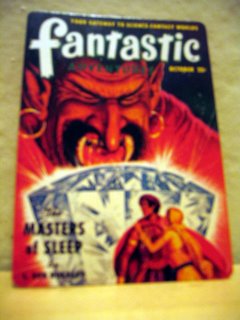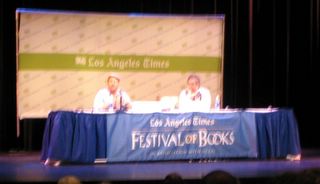My favorite time of year out here is when the
L.A. Times Festival of Books rolls around. Between the beautiful UCLA grounds, the gathering of the happy & book-loving masses, the impressive organization of the festival, and the writers writers everywhere, I am completely blissed out. I was only able to attend on Saturday this year, but I got my fix.
I started out the day at the
"Fertile Ground: Building a Creative Community" panel. I'm in the process of trying to sort out just how to do just that, so I was interested in what the panelists had to say. (It's becoming a festival tradition for me to feel some vague disappointment when moderator Richard Rayner works his wife into the conversation.)
John Baxter thinks the place to build a community is Paris, so he was little help.
Michael Walker's new book explores the Laurel Canyon music scene in the 1960s, and while it seemed very interesting, it's 2006 and I doubt I could afford to live there. Unsurprisingly, Carolyn See's advice and wisdom were most helpful and available for purchase in the form of her excellent book,
Making a Literary Life: Advice for Writers and Other Dreamers. During the panel, she read an excerpt from the section "Hang Out with People Who Support Your Work," a task much easier said than done. After the panel, I had Carolyn See sign a copy of her book, and she was kind enough to recall a phone conversation we had last summer about my dissertation. Her inscription reads: "The end times can be good times!" Amen.
Reports from the Chip Kidd panel next...
-
 7. Blue Angel by Francine Prose
7. Blue Angel by Francine Prose 8. Black Swan Green by David Mitchell
8. Black Swan Green by David Mitchell 9. The Diviners by Rick Moody
9. The Diviners by Rick Moody 10. Making a Literary Life by Carolyn See
10. Making a Literary Life by Carolyn See 11. Willful Creatures by Aimee Bender
11. Willful Creatures by Aimee Bender

















